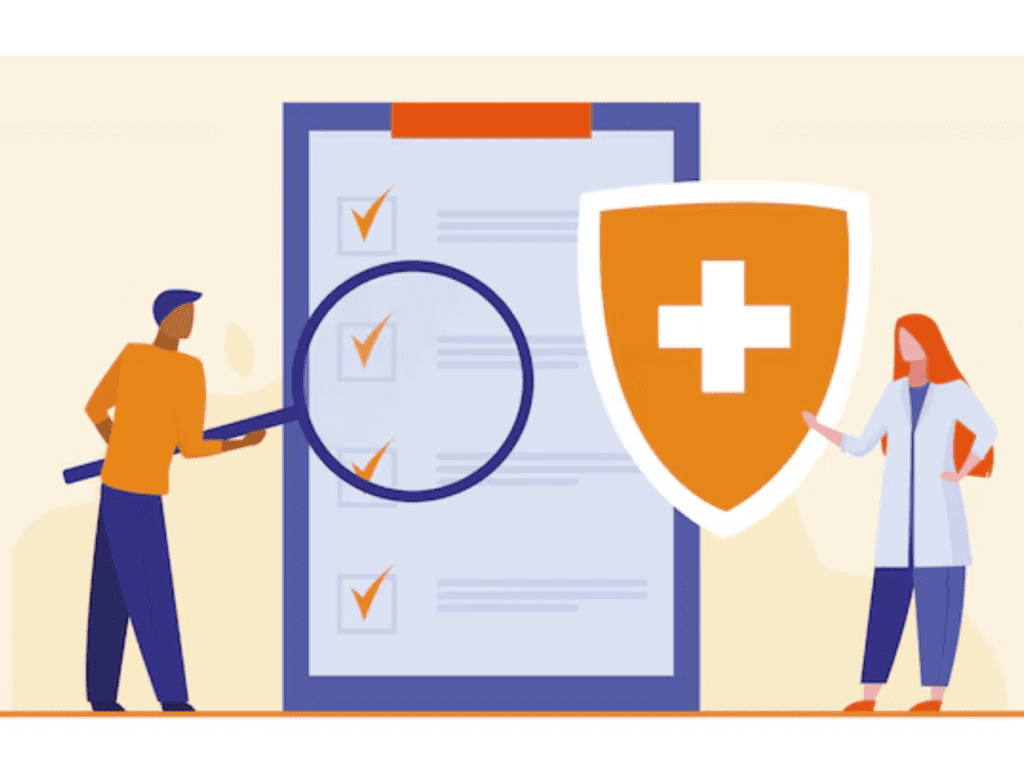Introduction
Health is perhaps the most precious resource an individual can possess and should be preserved at all costs. Most individuals tend to concentrate on curing diseases only after they occur, but the best method is to prevent illnesses before they emerge. Preventive care comes into play at this point. Preventive care consists of periodic medical examinations, vaccinations, screenings, and lifestyle modifications that detect health hazards early and prevent the occurrence of severe medical illnesses. Although it is crucial, most people shun preventive care because of costs or ignorance. Health insurance is a major factor in encouraging and facilitating preventive care through the coverage of necessary medical procedures, lowering the cost of healthcare, and urging people to look after their health. This article discusses the advantages of preventive care and how health insurance makes it more affordable and accessible to all.
Understanding Preventive Care
Preventive care refers to healthcare services that focus on disease prevention and early detection rather than waiting for symptoms to appear. It includes a wide range of medical services, tests, and screenings designed to help individuals maintain good health and avoid major medical conditions.
Types of Preventive Care
Preventive care services are categorized into various services, such as routine check-ups, immunizations, screenings, and lifestyle management programs. All these services have a function to maintain people in good health and avert long-term complications of health.
Routine Check-ups and Annual Physical Examinations
Routine medical check-ups aid in the tracking of overall health and identifying early signs of possible health problems. In these visits, physicians check vital signs, take medical history, and give advice on healthy living. Annual physical check-ups also involve blood work, weight and blood pressure checks, and consultation regarding any health problems.
Vaccinations and Immunizations
Vaccinations shield people from infectious illnesses and curb the transmission of diseases among communities. Immunization activities have effectively controlled the occurrence of diseases like measles, polio, hepatitis, and influenza. Health insurance commonly pays for vaccines as part of preventive services to make sure that people remain free from preventable diseases.
Screenings for Chronic Diseases
Most chronic diseases, including diabetes, heart disease, and cancer, develop slowly with no apparent symptoms in the initial phase. Regular screening identifies such illnesses early when they are easier to handle and treatment works better. Some examples of the necessary screenings are blood pressure testing, cholesterol screening, mammography for breast cancer, colonoscopies for colorectal cancer, and blood glucose testing for diabetes.
Mental Health Screening and Wellness Programs
Preventive care is not only for the physical but also the mental. Mental health screening can be conducted on a regular basis to diagnose stress, anxiety, depression, and other conditions of the mind before they turn serious. Counseling, therapy, and stress management classes are also included in preventive care. Mental health coverage is now provided in many health insurance policies so that people get proper support for their mental well-being.
Key Benefits of Preventive Care
Early Detection of Diseases and Better Treatment Outcomes
Preventive care aids in the early identification of different medical conditions, and this enhances the possibility of effective treatment. Most diseases like cancer and heart disease can be effectively treated or even cured if identified at their initial stages. Health screenings on a regular basis enable people to take proactive measures to deal with possible health threats before they become severe diseases.
Reduce Healthcare Costs in the Long Term
Medical interventions for chronic diseases are costly, comprising expensive procedures, hospitalization, and long-term medication. Preventive care saves on these expenses by identifying medical conditions early and minimizing the need for extensive medical procedures. It is usually much cheaper to treat a small health problem early compared to treating a severe condition later.
Better Quality of Life and Longer Life
By avoiding illness and controlling disease and health states early, the individual can be in a superior state of living and have enhanced overall well-being. Individuals taking regular preventive measures are likely to live longer, healthier lives than those who avoid taking care of their health. Preventive measures make individuals aware of healthy routines, including the practice of daily exercise, maintaining a balanced diet, and the management of stress, resulting in a healthier living style.
Decreased Hospitalization and Emergency Room Utilization
Preventive care prevents medical emergencies and hospitalization. Chronic illnesses like diabetes and high blood pressure may result in life-threatening complications if not properly addressed. Proper health monitoring and timely interventions lower the risk of emergencies, thereby ensuring that individuals avoid unnecessary and expensive medical interventions.
Promotes an Active Health Orientation
Most people see physicians only when they are sick or in pain. Preventive care encourages a more proactive mindset by urging people to take control of their health even when they don’t feel anything wrong. It is this approach that identifies unseen health threats and makes sure people get timely medical guidance and intervention.
How Health Insurance Supports Preventive Care
Health insurance is instrumental in making preventive care affordable and accessible to individuals. Most insurance companies understand the long-term advantages of preventive care and cover a broad spectrum of preventive services.
Coverage for Routine Check-ups and Health Screenings
The majority of health insurance schemes have routine check-ups and screening tests covered as part of the policy. Free or inexpensive screening tests for hypertension, diabetes, cholesterol levels, and certain forms of cancer can be obtained by policyholders. The tests ensure early detection of any ailments and enable individuals to take precautionary measures accordingly.
Vaccinations and Immunization Coverage
Health insurance companies reimburse the cost of necessary vaccines to keep people protected against preventable illnesses. They cover flu vaccinations, hepatitis vaccine, tetanus booster, and childhood immunization. Most health plans offer comprehensive coverage for vaccines, making them available to everyone regardless of age.
Financial Support for Chronic Disease Management
Patients with chronic diseases usually need regular medical treatment, drugs, and changes in lifestyle. Chronic disease management is facilitated by health insurance policies through coverage of visits to the doctor, prescription drugs, and medical consultations. This guarantees that patients can keep their conditions under control without financial constraints.
Wellness Programs and Lifestyle Support
Most insurance organizations have wellness schemes, which stimulate members to use healthier lifestyles. Examples of schemes range from gyms to cigarettes for quitting and healthy eating consultation services to reducing the stress brought by daily stress. By implementing healthier lives, insurance businesses lessen the cases of diseases, resulting in higher fitness levels across communities.
Access to Preventive Mental Health Care
Mental health is a part of general health and well-being. Most health insurance policies now cover mental health care, such as therapy sessions, psychiatric consultations, and stress management programs. This way, people get the support they need to stay mentally and emotionally healthy.
The Role of Employers and Government in Preventive Care
Employer-Sponsored Health Insurance Plans
Most companies offer health insurance coverage to their employees, which may include preventive care services. Employer-sponsored health plans promote employees to utilize regular health screenings, wellness programs, and preventive medical services. Some firms even provide other health incentives like discounts on gym memberships and mental health services.
Government Initiatives for Preventive Healthcare
Governments across the globe encourage preventive care by offering public health programs and subsidies. Most government-sponsored health insurance policies offer free or low-cost preventive services such as vaccinations, maternal health, and early childhood screenings. Public health campaigns also educate people about the need for preventive care and prompt medical intervention.
How to Incorporate Preventive Care into Your Daily Life
While health insurance makes preventive care more accessible, individuals must also take personal responsibility for their well-being. Adopting a proactive approach to health can significantly reduce the risk of chronic diseases and improve overall quality of life. Here are some practical ways to incorporate preventive care into daily life.
1. Schedule Regular Health Check-Ups
Most individuals shun going to physicians until they fall ill, yet regular checkups can reveal impending health hazards ahead of time. Having annual physical exams and implementing doctor’s recommendations can ensure small health problems turn into larger ones.
2. Stay Up to Date with Vaccinations
Vaccines are an important preventive measure against infectious diseases. Flu vaccines, child immunizations, or booster shots for adults are all examples of vaccinations that are important to maintain immunity against several diseases. Parents should also get their children vaccinated according to the schedule recommended.
3. Maintain a Balanced Diet
Nutrition is an integral component of preventive care. A balanced diet full of fruits, vegetables, whole grains, and lean proteins can fortify the immune system, control body weight, and decrease the risk of diseases like heart disease, diabetes, and obesity. Limiting processed foods, added sugars, and unhealthy fats is also key to long-term health.
4. Participate in Regular Physical Activity
Exercise is an important component of preventive health. At least 30 minutes of moderate exercise most days of the week can maintain a healthy weight, improve cardiovascular health, and lower stress levels. Exercise such as walking, swimming, yoga, and strength training supports overall health.
5. Prioritize Mental Health
Mental health is equally as significant as physical health. Stress, anxiety, and depression can lead to physical conditions like high blood pressure and heart disease. Mindfulness, relaxation exercises, therapy when necessary, and a robust social support system can foster mental health.
6. Avoid Harmful Habits
Lifestyle behaviors have a direct influence on health. Smoking, heavy drinking, and drug abuse heighten the risk of dangerous diseases like lung cancer, liver disease, and heart disease. Smoking cessation, alcohol restriction, and abstaining from harmful drugs add up to long-term gains in health.
7. Get Sufficient Sleep
It is vital to have quality sleep to maintain health. Sleep deprivation impairs the immune system, enhances stress, and makes it possible for chronic diseases like diabetes and high blood pressure to develop. Adults can sleep seven to nine hours every night to enable the body to relax and recover.
8. Manage Chronic Conditions Effectively
Those diagnosed with chronic conditions ought to actively care for themselves through adherence to recommended treatments, constant monitoring of their condition, and appropriate lifestyle changes. Routine check-ups with health practitioners ensure adequate control of diseases like diabetes, hypertension, and asthma.

